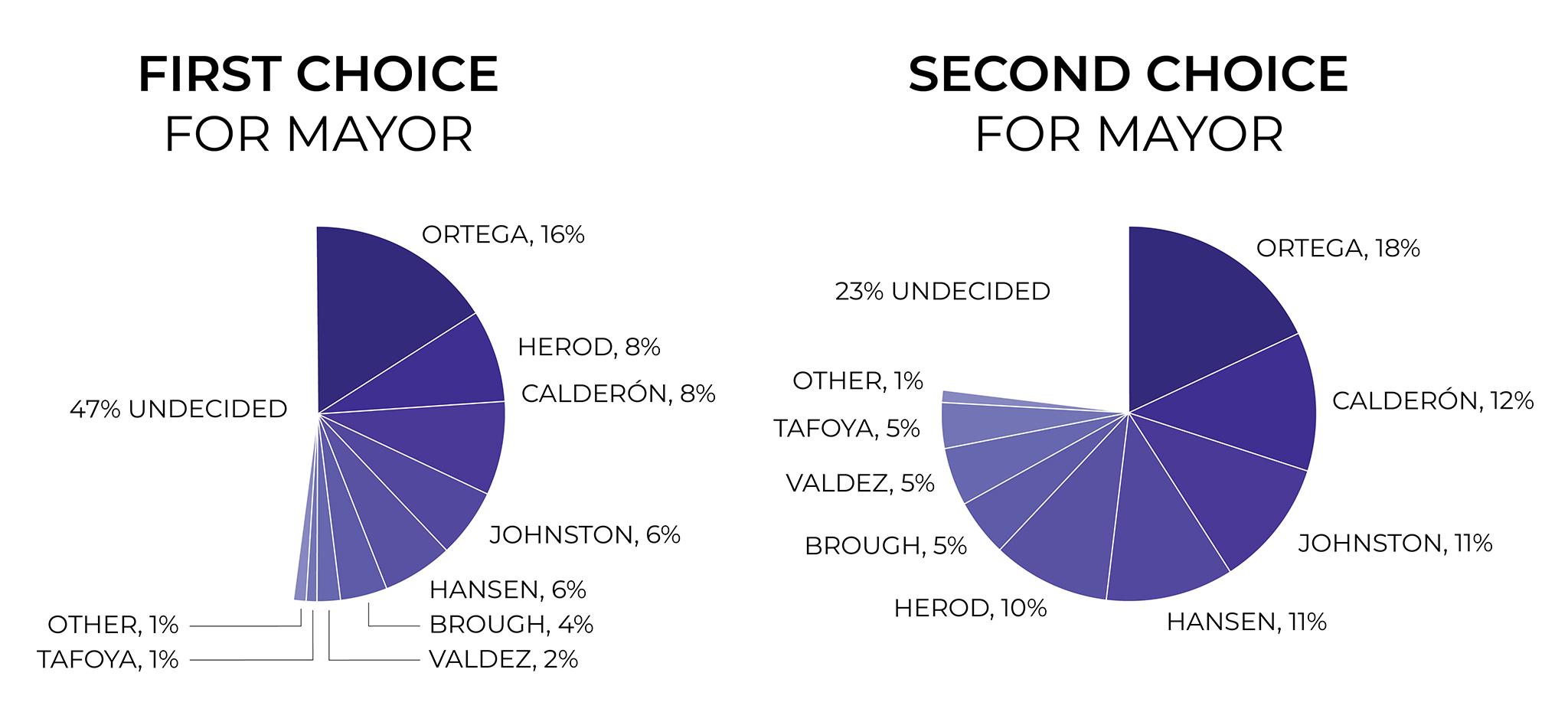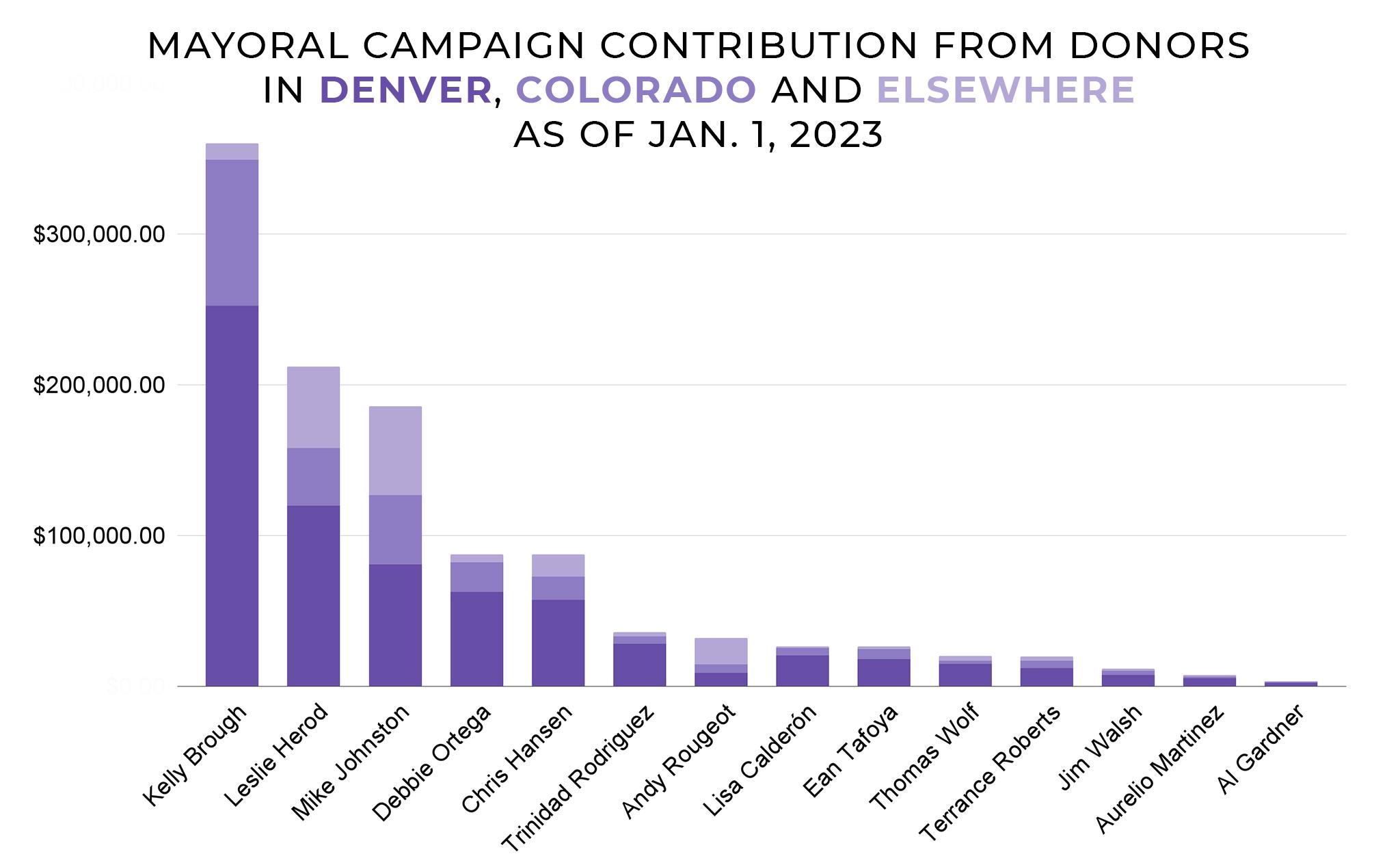The 2023 mayoral election is up for grabs. No Denver mayoral candidate has reached even 20% first-choice support, and 47% of voters are undecided.
That data comes from polling of 500 likely voters commissioned by Debbie Ortega's campaign and conducted by Democratic opinion research firm Searchlight Research.
This is the first large-scale polling to be released to the public by a mayoral candidate in the 2023 election cycle.
As the April election heats up, Denverites haven't seen much in the way of polling.
That leaves voters, media, campaigns and everybody else scratching their heads about where to focus their attention.
Who's in the lead? Who's the underdog? Who's beneath the paw of the underdog? Who knows?
At least three other campaigns and some business groups have conducted polling, according to pundit and former mayoral candidate James Mejia. No others have released that data -- and possibly for good reason. The numbers probably don't show those candidates in the lead.
According to Ortega's data, she is. Of the 500 voters surveyed, 16% picked Ortega as their first choice. Compare that to what Mayor Michael Hancock tallied in the first round of the 2019 municipal election: nearly 39% of the vote.
Still, Ortega's support doubles her nearest competitors, State Rep. Leslie Herod and Lisa Calderón, who were each the favorites of 8% of voters.
Both Mike Johnston and Chris Hansen were first picks for 6%.
Kelly Brough had 4%. Alex Valdez, who has left the race, had 2% and Ean Thomas Tafoya had 1%.
All of the other candidates put together have 1%.

Source: Searchlight Research/Debbie Ortega's campaign
There are currently a total of 17 candidates who turned in enough valid signatures to get on the ballot. They are Terrance Roberts, Ean Thomas Tafoya, Andy Rougeot, Kelly Brough, Debbie Ortega, Thomas Wolf, Leslie Herod, Aurelio Martinez, Lisa Calderón, Chris Hansen, James Walsh, Trinidad Rodriguez, Mike Johnston, Al Gardner, Robert Treta, Renate Behrens and Kwame Spearman.
Current levels of support appear to be based more on name recognition than campaign dollars.
When it comes to reported dollars raised through Dec. 31, Andy Rougeot tops the list with $532,526.96, yet his name didn't register above 1% on Ortega's poll. He is his own biggest donor, giving himself $500,000 in two contributions of $250,000 on July 20 and December 9.
He's followed by Kelly Brough, with $361,755.10, who is the first pick of just 4% of voters.
Herod, in second place on Ortega's poll, has $212,663.23.
Mike Johnston, in fourth place on the poll, has brought in $185,656.52.
And Ortega, in first, has only brought in $88,554.09.
Notably the third-place candidate on the poll, Lisa Calderón, has raised a mere $26,359.70.
These numbers include just contributions, not taxpayer-funded Fair Elections Fund matches, which will be updated later this week.

When it comes to mayoral campaign contributions, as seen above, Brough is in the lead, followed by Herod, Johnston, Ortega and Hansen. And if you look at dollars raised per day in the race, Johnston's got a sizable lead.
Here's how Ortega's poll was conducted.
The survey was conducted by phone. After participants were asked about whether they were decided and which candidates were their top two, the survey included questions about Ortega's messaging -- without her name. The researchers also asked some demographic information.
The poll was conducted between Jan. 11 and 14. In the mix were 48% registered Democrats, 43% registered independents and unaffiliated voters and 10% Republicans, reflecting the Denver electorate.
The researcher has 95% confidence in the data and noted it could be off -- plus or minus -- by four percentage points.
But really, what does polling data actually mean?
Mayoral candidates who enter a race with low name recognition -- hello, Federico Peña, and hello, John Hickenlooper -- can win in Denver, a city that likes to surprise itself.
"All a survey does is measure a point in time," said former mayoral candidate and political pundit James Mejia. Candidates lacking substantive ideas, perspective and momentum can fall behind fast.
"While there is, I think, a lot of truth in the direction of what a poll like that says, it has got to be matched with campaign organization and getting a message out," he added. "Because otherwise in these circumstances, you can't rely on that."
Mejia said campaigns ignore this sort of data to their own peril.
He learned that lesson the hard way, when his own campaign didn't pay attention to the numbers and ultimately lost.
"Information like that can be critical to where you spend your time and resources," he said. "Who exactly are you running against is the most important thing a poll like that can tell you."
And it might not be the obvious frontrunner that's a candidate's greatest threat. In Denver, where the winner will need 50% of voters plus one to claim victory in the municipal election, there will almost certainly be a run-off and the second-place candidate in the municipal election will be on that ballot.
Here's the twist: The favorite in the general election doesn't always win.
In the 2011 mayoral race, Hancock, who secured 30,811 votes in the general election, beat Chris Romer, who initially led with 32,170 votes. And then there's Wellington Webb's victory against general election favorite Norm Early in 1991.
Additional reporting from Ben Markus and Kevin J. Beaty.











